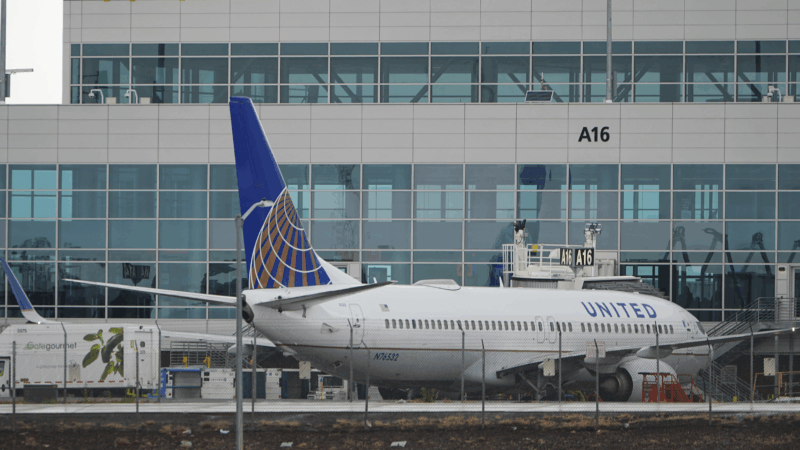Denver air traffic controllers had 2-minute communications outage, FAA official says
Pilots flying into Denver International Airport on Monday couldn’t communicate with air traffic controllers for about two minutes due to multiple radio transmitter failures, a leading official with the Federal Aviation Administration confirmed to members of Congress on Thursday.
Frank McIntosh, the deputy chief operating officer at the FAA, told a House committee that there was a loss of one of the air traffic controllers’ radio frequencies. Controllers have multiple frequencies, so operators turned to their backup frequency in this case, he said.
This backup went down “for approximately two minutes,” McIntosh said.
As emergency procedures dictate, controllers switched to a 121.5 MHz radio frequency, which is primarily used for aircraft communications and emergency situations, and they were able to connect with the aircraft and inform the pilots to switch to a secondary frequency, he explained.
The outage occurred at the Denver Air Route Traffic Control Center, which is located in Longmont, Colo., and handles airspace for most of Colorado and parts of several neighboring states.
The FAA said in a statement sent to NPR on Thursday that the outage lasted “approximately 90 seconds” at around 1:50 p.m. on Monday, “when both transmitters that cover a segment of airspace went down. Controllers used another frequency to relay instructions to pilots. Aircraft remained safely separated and there were no impacts to operations. The FAA is investigating.”
A Denver news station cited an outage lasting at least six minutes, but McIntosh said that was “over exaggerated.”
Denver7 Investigates first reported on Wednesday that as many as 20 pilots flying into the Denver International Airport on Monday couldn’t connect with air traffic controllers.
This news comes amid increasing scrutiny on the nation’s main aviation agency following multiple disruptive communications and radar outages at Newark Liberty International, a deadly midair crash in Washington, D.C., several near collisions, and air traffic controller staffing shortages.
As the FAA faces these many problems, the agency still does not have a permanent head. President Trump named acting Administrator Chris Rocheleau in January after previous head, Mike Whitaker, resigned on Inauguration Day.
McIntosh, who has been with the FAA for over two decades, was the one facing questioning from lawmakers on Wednesday and Thursday about recent failures and whether the civil aviation industry is safe.
McIntosh on Thursday was speaking to the House Transportation and Infrastructure Committee regarding updates to the FAA Reauthorization Act of 2024. He spoke about the Denver outage in response to a question from Rep. Robert Garcia of California.
“We know that the problems have gone back decades in some cases, but it’s still an absolutely shocking system failure, and we need immediate solutions,” Garcia said.
McIntosh testified on Wednesday that a hotline that provided direct communication between the Pentagon and the air traffic control tower at Ronald Reagan Washington National Airport has not functioned for more than three years. It’s unclear how much difference this would have made in preventing the January incident in which an Army Black Hawk helicopter and an American Airlines regional jet collided in midair, killing 67 people.
Also on Wednesday, Transportation Secretary Sean Duffy testified at a House Appropriations Committee hearing and faced multiple questions regarding outages at Newark. He confirmed to lawmakers that prior to the April 28 outage, which lasted somewhere between 30 and 90 seconds, there were similar blackouts in October and November. It’s unclear how long those outages lasted.
Duffy and the FAA have announced changes at Newark to improve technology at the airport and to slow down departures and arrivals. Duffy has also proposed a sweeping plan to modernize the air traffic control system. No concrete plan or dollar amount has yet been proposed to Congress, but a House committee recently estimated that modernizing the system could cost at least $12.5 billion.
‘Dawson’s Creek’ star James Van Der Beek has died at 48
Van Der Beek played Dawson Leery on the hit show Dawson's Creek. He announced his colon cancer diagnosis in 2024.
A Jan. 6 rioter pardoned by Trump was convicted of sexually abusing children
A handyman from Florida who received a pardon from President Trump for storming the U.S. Capitol on Jan. 6, 2021, was convicted on state charges of child sex abuse and exposing himself to a child.
A country-pop newcomer’s debut is your reinvention album of 2026
August Ponthier's Everywhere Isn't Texas is as much a fully realized introduction as a complete revival. Its an existential debut that asks: How, exactly, does the artist fit in here?
U.S. unexpectedly adds 130,000 jobs in January after a weak 2025
U.S. employers added 130,000 jobs in January as the unemployment rate dipped to 4.3% from 4.4% in December. Annual revisions show that job growth last year was far weaker than initially reported.
Greetings from Mexico City’s iconic boulevard, where a dog on a bike steals the show
Every week, more than 100,000 people ride bikes, skates and rollerblades past some of the best-known parts of Mexico's capital. And sometimes their dogs join them too.
February may be short on days — but it boasts a long list of new books
The shortest month of the year is packed with highly anticipated new releases, including books from Michael Pollan, Tayari Jones and the late Nobel laureate Mario Vargas Llosa.






